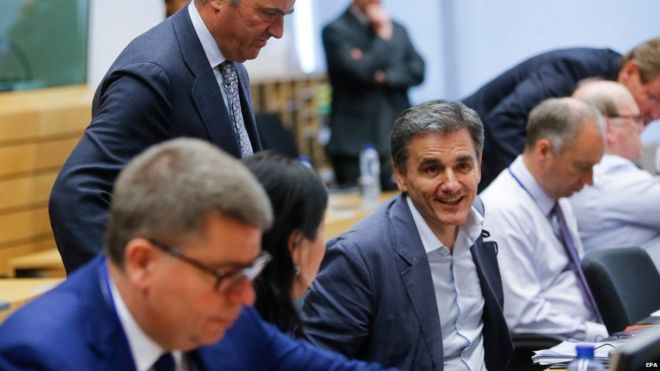
New Greek Finance Minister Euclid Tsakalotos (centre) has to persuade eurozone ministers they can trust Greece to implement reforms
Eurozone finance chiefs have warned of tough negotiations ahead as they meet to decide whether Greece’s new reform proposals merit a third debt bailout.
Germany’s Finance Minister Wolfgang Schaeuble said the talks would be “extremely difficult”.
Eurogroup chief Jeroen Dijsselbloem spoke of a “major issue of trust” over Greece’s resolve to implement reform.
But Greece’s Economy Minister Giorgos Stathakis told the BBC his government was “committed to moving forward”.
Early on Saturday, Greek MPs voted overwhelmingly in favour of the measures proposed by PM Alexis Tsipras – despite the fact that many of the ideas had been rejected by the Greek people in last Sunday’s referendum.
Follow the latest updates here
As the 19 eurozone ministers gathered in Brussels to discuss Greece’s plans, many said they remained to be convinced that Athens would follow through on its proposals.
Analysis: Chris Morris, BBC Europe correspondent
Technical experts from the EU and the IMF have recommended that Greece’s latest proposals for economic reforms and budget cuts can be a basis for negotiating a new international bailout.
That’s an important step, and if approved it should be enough to prevent Greece sliding into bankruptcy. But eurozone finance ministers will also want to have their say, and opinion is divided.
Some countries are optimistic: they believe Greece has at the eleventh hour come up with a serious and credible plan. Others are much less certain.
A huge lack of trust has developed over the past few months, and there are grave doubts in many countries about whether Greece will ever implement many of these reforms even if they are agreed on paper.
Why did Greece hold a referendum?
Did Greeks really fail to pay 89.5% of taxes?
“There are many concerns, quite a bit of criticism both on the content of the proposals, but also on the even more difficult issue of trust,” Mr Dijsselbloem said.
“How can we really expect this government to implement what it’s now promising. I think it’s going to be quite a difficult meeting.”
Mr Schaeuble was blunt: “We will definitely not be able to rely on promises.”
The job of convincing the ministers has fallen to Greece’s new Finance Minister Euclid Tsakalotos, who has replaced Yanis Varoufakis.
Greece’s Economy Minister appeared confident that a deal would be done “in the next 24 hours”.
“There are certain improvements compared to the proposal that was on offer before the referendum,” Mr Stathakis told the BBC. “The main one is debt restructuring.”
Greece is asking creditors for €53.5bn ($59.47bn; £38.4bn) to cover Greece’s debts until 2018, but the amount of the new bailout could reach €74bn, as Greece is seeking a restructuring of its massive debt, which it says is unsustainable.
Of the €74bn, €58bn could come from the EU’s bailout fund, the European Stability Mechanism, with €16bn from the IMF, sources said.
Greece’s creditors – the European Commission, European Central Bank and International Monetary Fund – have already provided more than €200bn in two bailouts over the past five years.
The second expired on 30 June, when Greece fell into arrears on an IMF loan.
Crisis countdown
- 11 July: Eurozone finance ministers discuss plans (Brussels 13:00 GMT)
- 12 July: Eurogroup leaders meet (14:00 GMT) followed by summit of all 28 members of the European Union (16:00 GMT). Both Brussels
- 20 July: €3bn payment due from Greece to the European Central Bank
Will EU leaders choose Grexit?
How has austerity affected the eurozone?
Ripple effect of crisis reaches Georgia
Following the eurozone finance ministers summit, Eurogroup leaders will meet in Brussels on Sunday afternoon, followed two hours later by a full meeting of EU leaders.
Without a deal, Greece risks crashing out of the euro.
Banks have been closed for two weeks now and a €60 (£43; $66) daily limit on cash machine withdrawals, imposed on 28 June, remains in force for Greek citizens. Many people say they have only been able to withdraw €50, as there are no smaller denomination notes.
The measures submitted in the new Greek document include:
- tax rise on shipping companies
- unifying VAT rates at standard 23%, including restaurants and catering
- phasing out solidarity grant for pensioners by 2019
- €300m ($332m; £216m) defence spending cuts by 2016
- privatisation of ports and sell-off of remaining shares in telecoms giant OTE
- scrapping 30% tax break for wealthiest islands.
Many of the ideas had previously been opposed by Mr Tsipras – and when put to the Greeks in a referendum last Sunday were soundly rejected.
Some members of Mr Tsipras’s own Syriza party voted against the proposals during the vote in parliament overnight, angry at his apparent U-turn on austerity.
Mr Tsipras has admitted that the package “entails many proposals that are far from our pledges, from what we feel is right for the recovery of the economy” and were only “marginally better” than proposals put forward by the creditors last month.
The BBC’s Mark Lowen in Athens says the package is a major climbdown for the prime minister.

At the scene: Jasmine Coleman, BBC News, Athens
Punters are watching for their numbers on TV screens outside a betting cafe in central Athens. Next to broadcasts of motorbike racing, lottery draws and athletics, TV commentators give the latest on the debt crisis.
But George Vassis, 45, is not betting on the politics. “Who knows what will happen?” he asks. Like many here, he is weary after months of talks and economic decline.
He runs a business information company and wants an end to the current deadlock. “Something must be done. The measures the government is offering are bad, but it’s the only way to go forward.”
Mr Tsipras has faced backlash to his proposals, but for George much of the damage has already been done. His company will have to make redundancies either way – he is just waiting to find out how many.
All Greek to you? Debt jargon explained
How easy is it to swap currencies?
BBC
 Q FM Africa's Modern Radio
Q FM Africa's Modern Radio